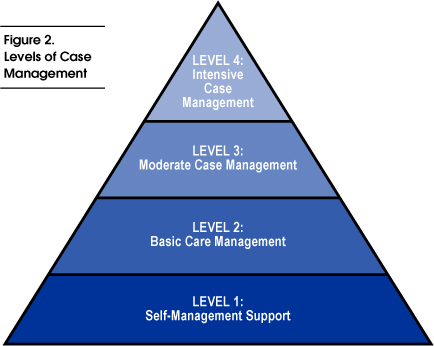Lesson 14: Case Management
Attention

We have discussed before that "Case Management" is the highest form of service that can be provided for a person living in the community. It represents the highest degree of need. We will explore here the concept of different levels of involvement in Case Management.
Learning Outcomes
Upon completion of this lesson's material, students will be able to:
- Explore the definitions and job duties of a case manager
Teaching
Case Managment
According to Wikipedia, Case Management is defined as:
the coordination of community services for mental health patients by allocating a professional to be responsible for the assessment of need and implementation of care plans. It is usually required for individuals who have a serious mental illness and need ongoing support in areas such as housing, employment, social relationships, and community participation. This level of support is also suitable for service users with a major psychotic disorder.
Basic Duties include:
- Assessment of need
- Care planning
- Implementation
- Regular review
Levels of Case Management

- Level 1
- Relatively well controled symptoms, family has self-management skills, relatively stable psychosocial status
- Level 2
- Relatively poor symptom control, family or support system needs assistance in developing support resources, medical issues, and psychosocial resrouces
- Level 3
- Poor symptom control, poor self-management skills in self, family, or support network, significant complications (psychosocial and otherwise)
- Level 4
- Poor symptom control, severe lack of self-management, need for other services (social work, respit, crisis, hospitalization, health, etc.)
Mental Health System view of Case Management
- The term "Case Management" has been over used
- Different agencies will define it differently
- There is no "centralized" Case Management in Maine
- Intensive Case Management and the ACT Team Models are the closest
- Other "Departments" may have better facilitatied Case Management
Case Management and PSR
- Core function of CM is to apply the PSR philosophy across the team
- Advocate
- Educator
- Motivational Counseling
Case Management Standards in Maine (link)
Standard 1
The Case Manager shall meet the standard set forth in the job description of a Case Manager with the Department of Health and Human Services (DHHS) or the standards set forth in the certification for Community Case Management.
Standard 2
The Case Manager shall use his or her professional skills and competence to serve the consumer, whose interests are of primary concern.
Case Managers have two sorts of ethical obligations. The first is to resolve all scheduling and procedural conflicts by giving preeminent consideration to the concerns of consumers and their families. While the convenience of a Case Manager is a legitimate concern, during the workday it is secondary to the convenience of the consumer.
The second obligation is to be sensitive to the possibility that the Department or Agency may make a policy decision for its own convenience rather than for the direct interest of consumers. If a Case Manager strongly feels that the Department or Agency is doing so, then the Case Manager has an obligation to raise the issue, first to the immediate supervisor; if this action does not provide resolution, the issue must be raised to successive levels of supervision and to the Office of Advocacy. As professionals, Case Managers are obligated to hold both themselves and the Department to the highest possible ethical standards.
Standard 3
The Case Manager shall ensure that consumers are involved in all phases of case management practice to the greatest extent possible.
The primary vehicle for assuring that consumers achieve this autonomy is the Person Centered Plan. However, some consumers elect not to have a Plan, and the Case Manager has the same obligations in these cases.
Standard 4
The Case Manager shall ensure the consumer's right to privacy and ensure appropriate confidentiality when information about the consumer is released to others. Case Managers are reminded that even in cases where a particular consumer appears to be unconcerned or uninterested in issues of privacy and confidentiality, Case Managers are still obligated to adhere to a high standard.
Standard 5
The Case Manager shall intervene at the consumer level to provide and/or coordinate the delivery of direct services to consumers and their families.
- Eligibility
- Referral and Intake
- Personal Planning Process
- Residential
- Developmental Disabilities Policies
Standard 6
The Case Manager shall intervene at the service systems level to support existing case management services and to expand the supply of and improve access to needed services. Case Managers are expected to become progressively more knowledgeable about resources available to consumers throughout their service areas.
Standard 7
The Case Manager shall be knowledgeable about resource availability, service costs, and budgetary parameters and be fiscally responsible in carrying out all case management functions and activities.
Standard 8
The Case Manager shall participate in evaluative and quality assurance activities designed to monitor the appropriateness and effectiveness of both the service delivery system in which case management operates as well as the case manager's own case management services, and to otherwise ensure full professional accountability.
Standard 9
The Case Manager shall carry a reasonable caseload that allows him to effectively plan, provide, and evaluate case management tasks related to consumer and system interventions.
Standard 10
The Case Manager shall treat colleagues with courtesy and respect, and strive to enhance interprofessional, intraprofessional, and interagency cooperation on behalf of the consumer.
Assessment
Lesson 14 Discussion
Essentially the role of the MHRT/C is the case manager. Review the duties and standards associated with this role. Is this the kind of work you envision doing? Discuss the element of case management where you are not really providing specific services and help, but finding others to do it.